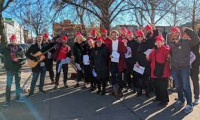

Today's guest, Annie Levin, co-founded the "Sing in Solidarity" radical choir in New York City as a way to demonstrate unity and convey a message, emotionally sustain the singers and strengthen rallies, actions and movements.
From her article, Radicals Go Caroling: The Untold Story of Progressive Choirs in YES! Magazine, December 21, 2021:
The power of song to literally transform the brain and move people to action has given it a place of privilege in mass political actions. Almost every revolutionary movement in modern history—the labor movement, the civil rights movement, the anti-apartheid movement, and so many more—has had an accompanying singing culture.
That’s because singing at protests isn’t just for pleasure. It works.
Choral singing is a physical demonstration of unity. It is a simple means of communication that gives participants the opportunity to voice their purpose collectively. In South Africa in the 1980s, protesters demonstrating against apartheid used a dance called the toyi-toyi, a militant bouncing from foot to foot, along with chanting and singing (in four-part harmony). Through song and dance, they were able to communicate their demands, create crowd unity, and present a formidable and frightening show for the armed soldiers they were confronting.
“You’re in a protest and it’s loud, and the streets are loud, and the cops are loud, and the sound of the city is loud,” says Savitri D, director of the New York City-based radical protest choir The Church of Stop Shopping. “How can you be heard? Well, you share a song together. A choir is a bullhorn.”
The songs of the civil rights movement of the 1950s and 60s, freedom songs like “We Shall Overcome,” “We Shall Not Be Moved,” and “This Little Light of Mine,” drew from the entire repertoire of the Black American song tradition. These simple, popular songs communicated a strong message during demonstrations, lowered tensions in situations with the threat of police violence, and kept morale high when demonstrators were sent to jail en masse. In Dr. Martin Luther King Jr.’s memoir Why We Can’t Wait, he called these songs the “soul of the movement.”
The choir has a new album coming out soon, Starvation Army: Band Music No. 1 Music to Fan the Flames of Discontent along with Chris Westover-Muñoz, Harris Ipock and The Brass Band of Columbus & Friends.
Here are some other articles on the same themes:
https://www.theguardian.com/science/2023/dec/15/a-mega-mechanism-for-bonding-why-singing-together-does-us-good
https://www.resilience.org/stories/2022-12-07/why-movements-need-to-start-singing-again/
- KBOO


